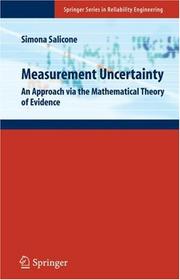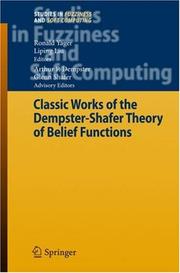| Listing 1 - 3 of 3 |
Sort by
|

ISBN: 0387463283 0387306552 1441940340 Year: 2007 Publisher: New York, NY : Springer US : Imprint: Springer,
Abstract | Keywords | Export | Availability | Bookmark
 Loading...
Loading...Choose an application
- Reference Manager
- EndNote
- RefWorks (Direct export to RefWorks)
The expression of uncertainty in measurement is a challenging aspect for researchers and engineers working in instrumentation and measurement because it involves physical, mathematical and philosophical issues. This problem is intensified by the limitations of the probabilistic approach used by the current standard (GUM). This text is the first to make full use of the mathematical theory of evidence to express the uncertainty in measurements. It gives an overview of the current standard, then pinpoints and constructively resolves its limitations through its unique approach. The text presents various tools for evaluating uncertainty, beginning with the probabilistic approach and concluding with the expression of uncertainty using random-fuzzy variables. The exposition is driven by numerous examples. The book is designed for immediate use and application in research and laboratory work. Prerequisites for students include courses in statistics and measurement science. Apart from a classroom setting, this book can be used by practitioners in a variety of fields (including applied mathematics, applied probability, electrical and computer engineering, and experimental physics), and by such institutions as the IEEE, ISA, and National Institute of Standards and Technology.
Uncertainty (Information theory) --- Dempster-Shafer theory. --- Random variables. --- Chance variables --- Stochastic variables --- Probabilities --- Variables (Mathematics) --- Belief functions (Probabilities) --- Dempster-Shafer theory of evidence --- Shafer theory, Dempster --- -Probabilities --- Measure of uncertainty (Information theory) --- Shannon's measure of uncertainty --- System uncertainty --- Information measurement --- Questions and answers --- Mathematics. --- Electronics. --- Distribution (Probability theory. --- Measure and Integration. --- Electronics and Microelectronics, Instrumentation. --- Measurement Science and Instrumentation. --- Probability Theory and Stochastic Processes. --- Math --- Science --- Electrical engineering --- Physical sciences --- Distribution functions --- Frequency distribution --- Characteristic functions --- Measure theory. --- Microelectronics. --- Physical measurements. --- Measurement . --- Probabilities. --- Probability --- Statistical inference --- Combinations --- Mathematics --- Chance --- Least squares --- Mathematical statistics --- Risk --- Measuring --- Mensuration --- Technology --- Metrology --- Physical measurements --- Measurements, Physical --- Mathematical physics --- Measurement --- Microminiature electronic equipment --- Microminiaturization (Electronics) --- Electronics --- Microtechnology --- Semiconductors --- Miniature electronic equipment --- Lebesgue measure --- Measurable sets --- Measure of a set --- Algebraic topology --- Integrals, Generalized --- Measure algebras --- Rings (Algebra) --- Measurement.
Book
ISBN: 3540692878 354069286X Year: 2008 Publisher: Berlin, Germany : Springer,
Abstract | Keywords | Export | Availability | Bookmark
 Loading...
Loading...Choose an application
- Reference Manager
- EndNote
- RefWorks (Direct export to RefWorks)
Mechatronic design processes have become shorter and more parallelized, induced by growing time-to-market pressure. Methods that enable quantitative analysis in early design stages are required, should dependability analyses aim to influence the design. Due to the limited amount of data in this phase, the level of uncertainty is high and explicit modeling of these uncertainties becomes necessary. This work introduces new uncertainty-preserving dependability methods for early design stages. These include the propagation of uncertainty through dependability models, the activation of data from similar components for analyses and the integration of uncertain dependability predictions into an optimization framework. It is shown that Dempster-Shafer theory can be an alternative to probability theory in early design stage dependability predictions. Expert estimates can be represented, input uncertainty is propagated through the system and prediction uncertainty can be measured and interpreted. The resulting coherent methodology can be applied to represent the uncertainty in dependability models.
Computer science. --- Computers. --- Artificial intelligence. --- Applied mathematics. --- Engineering mathematics. --- Computer Science. --- Theory of Computation. --- Appl.Mathematics/Computational Methods of Engineering. --- Artificial Intelligence (incl. Robotics). --- Engineering --- Engineering analysis --- Mathematical analysis --- AI (Artificial intelligence) --- Artificial thinking --- Electronic brains --- Intellectronics --- Intelligence, Artificial --- Intelligent machines --- Machine intelligence --- Thinking, Artificial --- Bionics --- Cognitive science --- Digital computer simulation --- Electronic data processing --- Logic machines --- Machine theory --- Self-organizing systems --- Simulation methods --- Fifth generation computers --- Neural computers --- Automatic computers --- Automatic data processors --- Computer hardware --- Computing machines (Computers) --- Electronic calculating-machines --- Electronic computers --- Hardware, Computer --- Computer systems --- Cybernetics --- Calculators --- Cyberspace --- Informatics --- Science --- Mathematics --- Uncertainty (Information theory) --- Reliability --- Mathematical models. --- Measure of uncertainty (Information theory) --- Shannon's measure of uncertainty --- System uncertainty --- Information measurement --- Probabilities --- Questions and answers --- ADP systems (Computer systems) --- Computing systems --- Systems, Computer --- Electronic systems --- Cyberinfrastructure --- Information theory. --- Mathematical and Computational Engineering. --- Artificial Intelligence. --- Communication theory --- Communication --- Dempster-Shafer theory. --- Reliability. --- Belief functions (Probabilities) --- Dempster-Shafer theory of evidence --- Shafer theory, Dempster --- -Probabilities

ISBN: 9783540253815 3540253815 354044792X Year: 2008 Volume: v. 219 Publisher: Berlin, Germany ; New York, New York : Springer,
Abstract | Keywords | Export | Availability | Bookmark
 Loading...
Loading...Choose an application
- Reference Manager
- EndNote
- RefWorks (Direct export to RefWorks)
This book brings together a collection of classic research papers on the Dempster-Shafer theory of belief functions. By bridging fuzzy logic and probabilistic reasoning, the theory of belief functions has become a primary tool for knowledge representation and uncertainty reasoning in expert systems. This book will serve as the authoritative reference in the field of evidential reasoning and an important archival reference in a wide range of areas including uncertainty reasoning in artificial intelligence and decision making in economics, engineering, and management. From over 120 nominated contributions, the editors selected 30 papers, which are widely regarded as classics and will continue to make impacts on the future development of the field. The contributions are grouped into seven sections, including conceptual foundations, theoretical perspectives, theoretical extensions, alternative interpretations, and applications to artificial intelligence, decision-making, and statistical inferences. The book also includes a foreword by Dempster and Shafer reflecting the development of the theory in the last forty years, and an introduction describing the basic elements of the theory and how each paper contributes to the field.
Neural networks (Computer science) --- Fuzzy systems --- Artificial intelligence --- Dempster-Shafer theory --- Réseaux neuronaux (Informatique) --- Systèmes flous --- Intelligence artificielle --- Dempster-Shafer, Théorie de --- Artificial intelligence. --- Dempster-Shafer theory. --- Fuzzy systems. --- Neural networks (Computer science). --- Computer Science --- Mathematical Statistics --- Applied Mathematics --- Civil Engineering --- Civil & Environmental Engineering --- Engineering & Applied Sciences --- Mathematics --- Physical Sciences & Mathematics --- Belief functions (Probabilities) --- Dempster-Shafer theory of evidence --- Shafer theory, Dempster --- -AI (Artificial intelligence) --- Artificial thinking --- Electronic brains --- Intellectronics --- Intelligence, Artificial --- Intelligent machines --- Machine intelligence --- Thinking, Artificial --- Systems, Fuzzy --- Artificial neural networks --- Nets, Neural (Computer science) --- Networks, Neural (Computer science) --- Neural nets (Computer science) --- Engineering. --- Game theory. --- Applied mathematics. --- Engineering mathematics. --- Economic theory. --- Appl.Mathematics/Computational Methods of Engineering. --- Artificial Intelligence (incl. Robotics). --- Game Theory, Economics, Social and Behav. Sciences. --- Economic Theory/Quantitative Economics/Mathematical Methods. --- AI (Artificial intelligence) --- Bionics --- Cognitive science --- Digital computer simulation --- Electronic data processing --- Logic machines --- Machine theory --- Self-organizing systems --- Simulation methods --- Fifth generation computers --- Neural computers --- -Probabilities --- System analysis --- Fuzzy logic --- Natural computation --- Soft computing --- Mathematics. --- Mathematical and Computational Engineering. --- Artificial Intelligence. --- Economic theory --- Political economy --- Social sciences --- Economic man --- Math --- Science --- Engineering --- Engineering analysis --- Mathematical analysis --- Games, Theory of --- Theory of games --- Mathematical models
| Listing 1 - 3 of 3 |
Sort by
|

 Search
Search Feedback
Feedback About UniCat
About UniCat  Help
Help News
News